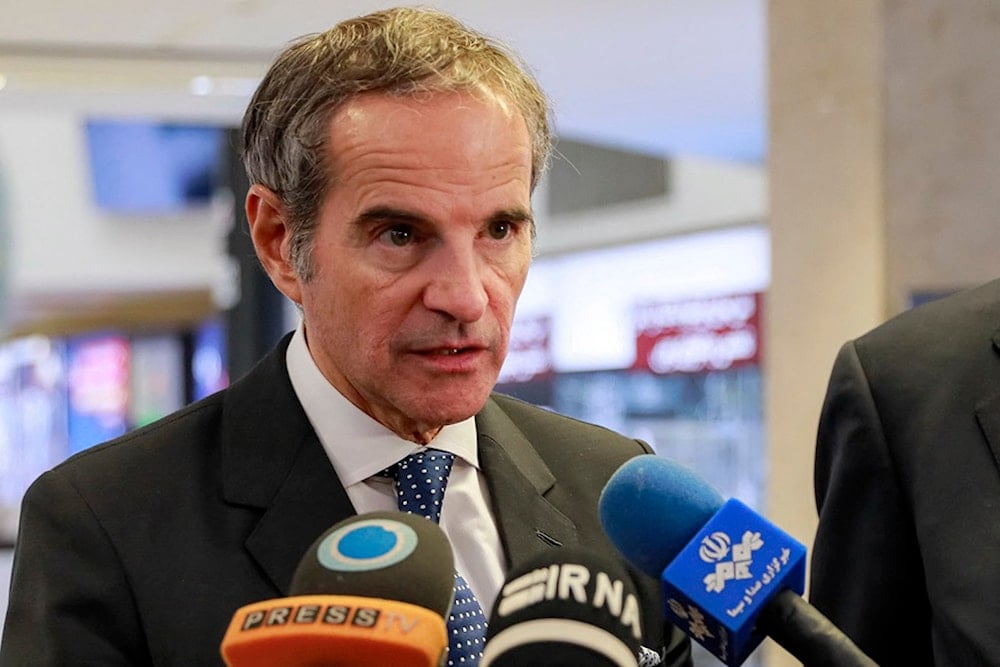Threats against Iran's nuclear facilities ‘unacceptable’: IAEA chief
Grossi's remarks come as US President Donald Trump continues to threaten with strikes on Iranian nuclear facilities should current talks with Tehran fail to yield results.
-
 This handout picture made available by the Atomic Energy Organisation of Iran (AEOI) office shows Director-General of the International Atomic Energy Agency (IAEA) Rafael Grossi speaking to reporters during a tour of the organization headquarters in Tehran with the head of the AEOI on April 17, 2025 (AFP)
This handout picture made available by the Atomic Energy Organisation of Iran (AEOI) office shows Director-General of the International Atomic Energy Agency (IAEA) Rafael Grossi speaking to reporters during a tour of the organization headquarters in Tehran with the head of the AEOI on April 17, 2025 (AFP)
Threats of strikes on Iranian nuclear facilities are "unacceptable", stressed the chief of the UN nuclear watchdog on Thursday.
"The IAEA has always emphasized that threats against Iran's nuclear facilities are unacceptable and that the attacks that are being discussed could not only worsen existing problems, but also create more serious environmental consequences," Rafael Grossi was quoted as saying by the IRIB news agency.
On Wednesday, The New York Times reported that US President Donald Trump blocked an Israeli plan to strike Iranian nuclear facilities, as Washington pursues renewed diplomatic efforts to limit Tehran's nuclear program.
The US and Iran—who have had no formal diplomatic relations for over four decades—are working toward a new nuclear agreement following Trump’s withdrawal from the 2015 landmark deal during his first term in office.
US Special Envoy Steve Witkoff is scheduled to meet Iranian Foreign Minister Abbas Araghchi in Rome on Saturday. The meeting follows high-level nuclear talks between the two countries last week, marking the most senior engagement since the 2015 accord collapsed.
In March, Trump sent a letter to Iran’s Leader Sayyed Ali Khamenei, calling for negotiations but also warning that military action remained an option should talks fail to yield results.
Trump administration officials told The New York Times that "Israel" had sought US backing for a strike on Iranian nuclear infrastructure as early as May.
The proposed plan, including potential operational details, had reportedly been under consideration for several months.
However, during Israeli Prime Minister Benjamin Netanyahu’s visit to the White House last week, Trump informed Israeli officials that the US would not support such an operation. Instead, the president publicly announced the initiation of "direct talks" with Tehran.
IAEA should be involved in Iran-US nuclear talks, chief says in Tehran
On Thursday, Grossi said the International Atomic Energy Agency (IAEA) seeks to play a role in the negotiations between Iran and the US.
Speaking at a press conference in Tehran, Grossi said he had discussed with Mohammad Eslami, head of Iran’s Atomic Energy Organization, how the IAEA could support the ongoing talks between Tehran and Washington.
He acknowledged that the negotiation process is complex and pointed out that some parties are opposed to the talks producing results.
Nevertheless, Grossi stressed the importance of continued efforts to achieve peace.
The IAEA chief emphasized that any potential agreement between Iran and the US must be credible, something that would require IAEA verification.
He reiterated the agency’s intention to be involved in the dialogue, saying it is essential to understand Iran’s expectations.
Grossi added that he is also "in contact with the American negotiator to see how the agency can be a bridge between Iran and the US, and help achieve a positive outcome in the negotiations."
Time running out for Iran, US to reach deal, Grossi says
Grossi warned that time is running out for Iran and the US to reach a deal, as the two sides prepare for a new round of nuclear negotiations this weekend.
"We are in a very crucial stage of these important negotiations. We know we don't have much time, this is why I am here ... to facilitate this process," Grossi said during a visit to Tehran.
"We are working hard and we want to succeed," he added at a joint press conference with Eslami, acknowledging the difficulty of reaching an agreement.
On Wednesday, Grossi met with Iranian Foreign Minister Abbas Araghchi, who had led the first round of talks with US Special Envoy Steve Witkoff the previous weekend.
Araghchi described his meeting with Grossi as “useful,” and emphasized that the IAEA could play a "crucial role" in the peaceful resolution of the Iranian nuclear file in the coming months.
He also urged the IAEA to remain impartial and “keep the agency away from politics,” warning of "spoilers" attempting to derail the negotiations.
Grossi claims Iran ‘not far’ from nuclear bomb
In comments to Le Monde before arriving in Tehran yesterday, Grossi claimed that Iran was “not far” from possessing a nuclear bomb.
Western nations have long accused Iran of seeking to develop nuclear weapons—an allegation Tehran has repeatedly denied.
After Trump exited the 2015 accord, Iran began rolling back its commitments under the deal, which had granted sanctions relief in exchange for strict limits on its nuclear program monitored by the IAEA.
According to the agency’s latest report, Iran currently possesses approximately 274.8 kilograms (605 pounds) of uranium enriched up to 60%—a level far above the 3.67% cap set by the 2015 agreement, though still below the 90% required for a nuclear weapon.
Read more: Trump says not rushing military action against Iran

 5 Min Read
5 Min Read










